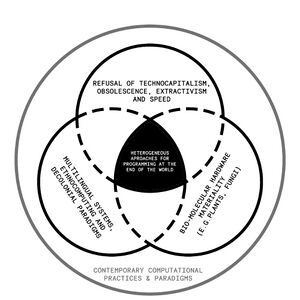How to rethink computational practices for future where the tools and infrastructure that we take for granted are no longer available? Is it possible to decouple the idea and practice of computing from its extractivist materiality and anglophone scope of knowledge?
The long-stablished computational tools that are so often deemed essential in contemporary society have reached the point of being perceived as natural, given realities that overlook the engineered oppression and imperialist rationale embedded in dominant hardware and software. Moreover, digital informational technologies require an ever-increasing access to data, computational power, and infrastructure that gets entrenched over the entire planet, both literally and epistemologically.
The allure of computational fetishism, with its constant promises of newer and better technologies, exacerbates the strain on our planet's resources as one of the industries with the biggest carbon footprint that are predicted to only increase (Freitag et al. 2021). Paradoxically, as society becomes more dependent on these advanced tools, users and programmers alike [1] find themselves increasingly detached from the inner workings of the machines they interact with daily. This predicament prompts a critical investigation of anti-capitalist alternatives to computation, decoupling it from big tech platformization and the commodity of the Cloud.
The central query arising from this discussion is the exploration of paths that diverge from the current computational paradigms characterized by capitalist overproduction, relentless innovation, and extractivist materiality. Rather than advocating for a simplistic return to retro-computing frameworks, the proposition is to underscore the importance of subverting, reimagining, and repurposing technology. Computers, with their complicated history, have long been entangled with harmful materiality, engineered biases, and discriminatory practices, particularly against multicultural perspectives and epistemes beyond the English-speaking West.
In response to that, there isn’t a single and universal solution, but a proliferation of alternatives. In a “prompted everything” era it can be challenging to step back and inspect the inner logics of current black-boxed devices to understand how operational systems and programming languages work to propose radical alternatives to already established paradigms. The time and hard skills involved leave out many people who can’t afford to be this critical of big tech and industry practices, turning recent concepts such as Permacomputing (Heikkilä 2020), benign computing (Raghavan 2015), Collapse Informatics (Penzenstadler et al. 2015) and related propositions [2] into a very white male-dominated, hardcore-programmer niche that flirts with purist ideologies and bourgeois romanticism (Mansoux et al. 2023).
However, it could also be argued that the populations of many global majority countries face material limitations and economic hardships that requires ingenious alternative solutions as a way to hack reality in everyday life, exemplified by Brazilian ‘gambiarras’ and Cuban ‘rikimbilis’, what researcher Ernesto Oroza names as ‘objects of necessity’ (Oroza 2006). Implementing such alternatives necessitates mundane yet crucial work that like refactoring, maintenance, care, and a calculated use of resources. (Raghavan and Hasan in de Valk, 2022) Even though these will never be as exciting and fast as today’s cutting-edge devices, they offer what might be the only long-lasting option in an increasingly exhausted planet.

- ↑ The categories of computer operators here is deliberately simplistic to emphasize the great hierarchical divide that permeates the majority Operational Systems (OS) in use. This approach started to be introduced back to the 1960s with the intention of promoting digital literacy and increasing the agency of users who weren’t versed in programming, giving them “access to the control panel of civilization” (Rushkoff, 2010, cited in Vee, 2013, p. 43). However, the apparent democratization of computer operations through GUIs ended up widening the disconnection between the average user and the device they operate.
- ↑ This vast proliferation of interrelated terms and definitions are being gathered and organized by artist and researcher Marloes de Valk in the ‘Damaged Earth Catalog’ (2023) as part of her PhD research project, in which the term ‘permacomputing’ stands out for its ties with permaculture principles. She also raises concerns over the lack of intersectional feminist representation in the scene. Available online at: https://damaged.bleu255.com/about/